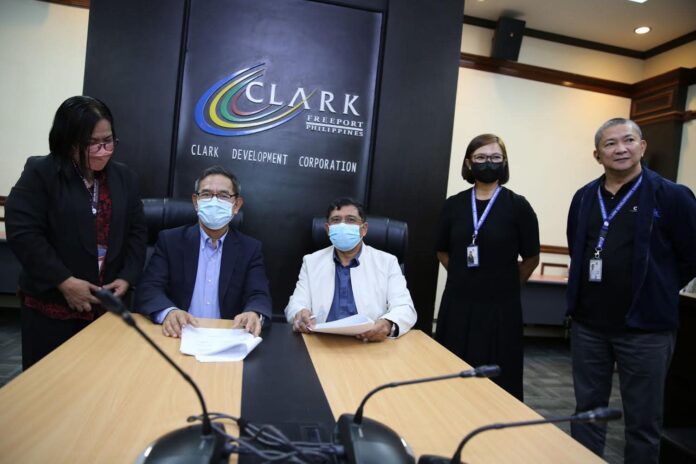
- Clark Freeport Zone to adopt Unified Logistics Pass
- Clark Development Corp and Anti-Red Tape Authority inked a memorandum of agreement for pilot implementation of the ULP in Clark Freeport Zone
- ULP is designed to eliminate separate permits, licenses, and pass-through stickers required by various economic zones, ports, and local government units
- The pass is seen to facilitate movement and ease port entry of cargo trucks
Clark Freeport Zone will adopt the Unified Logistics Pass (ULP) to facilitate movement and ease port entry of cargo trucks.
Clark Development Corp. (CDC) and Anti-Red Tape Authority (ARTA) recently inked a memorandum of agreement and a joint memorandum circular for the pilot implementation of ULP, a single pass in the form of a quick response code designed to eliminate separate permits, licenses, and pass-through stickers required by various economic zones, ports, and local government units.
CDC president and chief executive officer Manuel R. Gaerlan and ARTA deputy director general for operations Ernesto V. Perez signed the MOA and JMC, CDC said in a statement.
Gaerlan said ULP will bolster the promotion of ease of doing business at the Freeport.
For his part, Perez underscored the benefits of utilizing ULP for truckers and logistics service providers. The pass “will eliminate ‘colorum’ trucks and vehicles”. In addition it will assure investors, truckers, and other logistics providers of seamless and unimpeded travel, he added.
ARTA earlier said ULP would adopt a single registration scheme for trucking companies. The QR code provided would be accepted by all government agencies, including LGUs, port authorities, and economic zones.
The project was officially launched last January 2022 with the signing of MOA and JMC for the pilot implementation by various government agencies, port operators, and private sector partners.
READ: Single pass for cargo trucks launched this month
CDC was part of the nine areas supposed to start pilot implementation in January to February, as announced during the January launching. In a briefing with truckers last February, Perez said the target pilot implementation was moved to late March.
Citing data from the World Bank Group (WBG), Perez earlier said the ULP system is expected to streamline documentary requirements from 209 to 56 or by about 73%, and cut processing time from 271 days to 35 days or by 87%.
Using standard model cost calculation, the WBG also said the Philippine government can save over P1.9 billion in funds with the ULP.
Implementation of the ULP is also seen to lower cost of basic goods by eliminating various port and pass-through fees that truckers have to pay and eventually pass on to clients.
Perez added ULP can “mitigate road traffic” since trucks with the ULP will not be stopped by government and traffic authorities for inspection. He said it would rid the country’s roads of non-franchised or colorum container trucks as the ULP will only be issued to legitimate holders of Certificate of Public Convenience.
Stakeholders, especially truckers, have long been complaining about these pass-through fees collected by LGUs, especially LGUs in Metro Manila.
The ULP is a migration from the RapidPass, an online system implemented in 2020giving frontliners and Allowed Persons Outside of Residences quick passage through checkpoints in Metro Manila during community quarantine periods.
RapidPass developer DevConnect and Department of Information and Communications Technology are assisting in the ULP project.
The ULP is part of ARTA’s National Effort for the Harmonization of Efficient Measures of Inter-related Agencies or Project NEHEMIA. Launched in March 2020, Project NEHEMIA is a sector-based streamlining effort that involves both capacity building with identified agencies and public hearings with stakeholders regarding existing and new regulations.
Logistics is one of five sectors included in the first phase of Project NEHEMIA.




